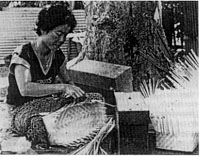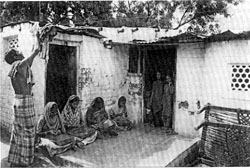We All Women Workers
We Entitle the Same Workers' Rights
| Part-time workers are: the employed persons whose normal hours of work are less than full-time workers. |
Homeworkers are: carrying out work at home or premises of their own choice, work for remuneration, resulting in a product or services specified by the employer. |
We call on the governments to commit themselves to protect women workers rights, particularly in the reality of casualisation and flexibilisation of women labour force that aggravate the exploitation of women workers.
We demand the governments :
- to immediately ratify the International Labour Convention on Part-time workers, No. 175 and Convention on Home Work, No.177;
- to establish national policies, laws and regulations according to the ILO conventions to guarantee the legal rights as part-time workers and homeworkers;
- to implement these policies, laws and regulations at local level to ensure that part-time and homeworkers' rights are protected;
- to set up an effective and active mechanism to inspect, monitor and ensure the practice and protection to casual and flexible workers;
- adequate remedies, including penalties, for violation of these laws and regulations shall be provided for and effectively applied.
All Workers Unite and Fight for Our Rights
International Labour Convention Specify Our Same Rights to:
|
|
For Part-time Workers:
|
For Homeworkers:
|
 Photo from ILO Publication of a Homebased Worker in Thailand |
 Photo from ILO Publication: Poor working condition of beedi rollers in India |
How You Can Join the Campaign?
- We encourage the local groups and CAW's network groups to translate some of the information into local languages and distribute among women workers and the public, including the government and employers to raise their awareness.
- We encourage the local women workers groups and CAW's network groups to organise meetings among women workers who are part-time workers or homebased workers to discuss about their problems, what to do (strategy and actions) and their demands on government and employers. You can make use of the information in the AWWN, the leaflet and the signature campaign sheet.
- To collect as many signatures as possible (from individuals or organisations) to support the campaign, sign in the A-4 size sheet paper (DOWNLOAD the Signature form). (please photo-copy if not enough space). After collecting the signatures, send them to your concerned government authority. Please make a copy of the signatures and send them to CAW secretariat by fax or mail, latest by the end of November, 1998. After CAW secretariat collects all the signatures from different countries, we will make copies and send to the concerned government authorities (including Prime Minister, Foreign Minister and Labour Minister) of all Asian governments and those countries where the signatures coming from, as well as the ILO office, to express our demands. We request you to join and support the campaign which is concerning all grassroots women workers whose rights as workers and as women are deteriorating everyday.